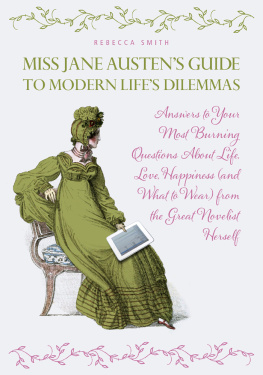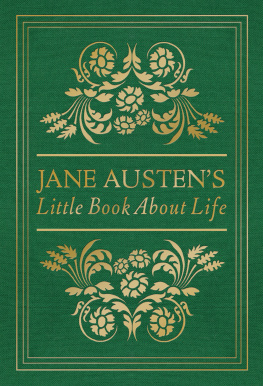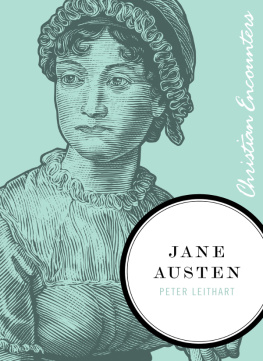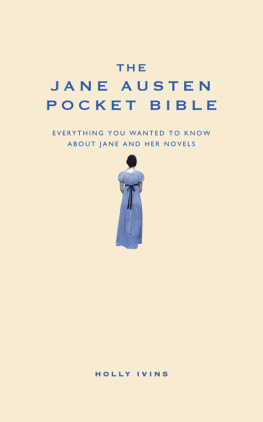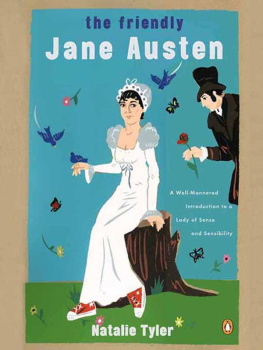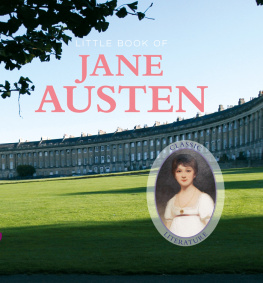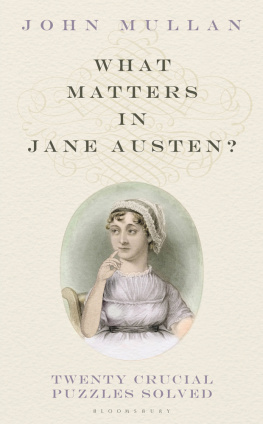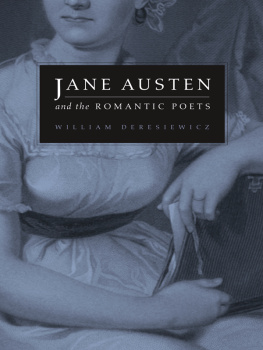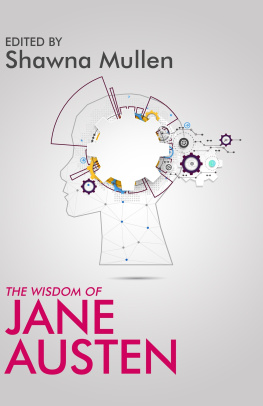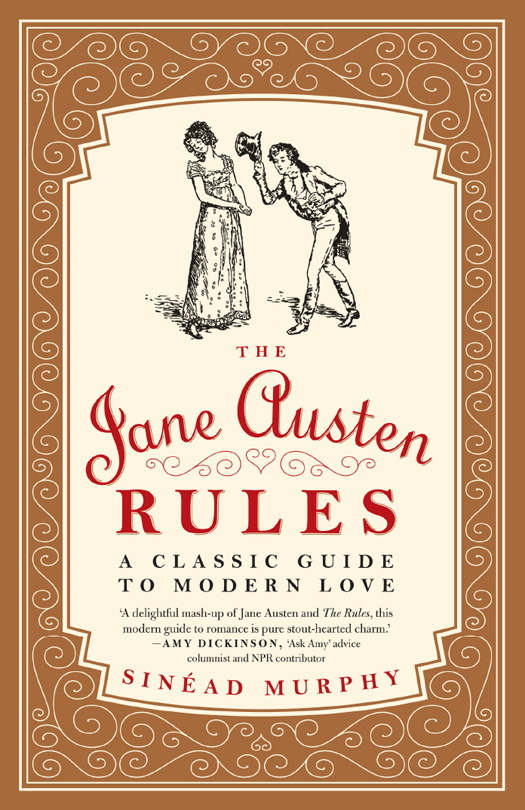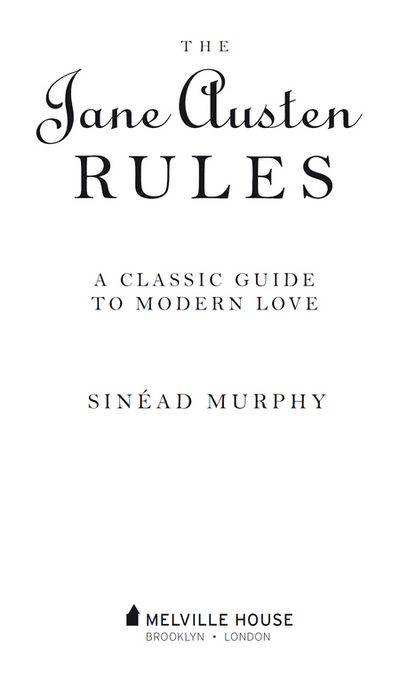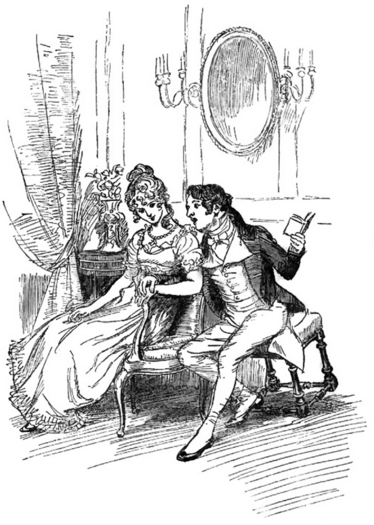Murphy, Sinad.
The Jane Austen rules : a classic guide to modern love / Sinead Murphy.
pages cm
ISBN 978-1-61219-382-3 (paperback)
ISBN 978-1-61219-383-0 (ebook)
1. Austen, Jane, 17751817KnowledgePsychology. 2. Austen, Jane, 17751817CharactersHeroines. 3. Femininity in literature. 4. Mate selection in literature. 5. Courtship in literature. 6. Self-actualization (Psychology) in women. 7. Man-woman relationships. I. Title. II. Title: Classic guide to modern love.
PR4038.P8M87 2014
823.7dc23
The illustrations in this book originally appeared in Hugh Thomsons illustrated editions of Jane Austens novels, first published between 1894 and 1898.
To my mother, Joan, whose love of literature meant that I read Jane Austen when I was still very young
After all, there is no enjoyment like reading!
THE REAL THING
It ought to be a truth universally acknowledged, that a young woman in possession of a large number of modern dating guides must be in want of Jane Austen! Why? Because the novels of Jane Austen are still our safest guide to the rough-and-tumble course that is true love. The aim of this book is to prove that this is so.
But can Jane Austens novels really offer advice that our bestselling dating books cannot? What, after all, can they really have to tell us, that we have not now been told at least a hundred times over? That women have substance to them, that is what! That women are the real thing.
When Jane Austen began to publish, around the beginning of the nineteenth century, novels were not yet all that popular. Young ladies instead passed their time by reading conduct books, Regency Englands equivalent of the modern dating guide, full of dos and donts for the woman who wished to flourish in society. Gradually, however, women began to spend less and less time reading conduct books and more and more time reading novels, which also provided advice on what a woman should and should not do, but in a manner that was much more entertaining and very importantly! much more emancipatory.
You see, the Regency conduct book tended to judge a woman by how she conducts herself that is, by how she acts, by how she seems. The novel, by contrast, was concerned with what women are really like, admitting perhaps for the very first time that women too have a fulsome interior life, with thoughts and feelings that are as crucial to get right as the actions that follow from them. In the novel it was much more important that a woman cultivate herself than that she learn how to appear to do so, much more crucial that she be truly worthy than that she learn how to make herself seem so. In the novel, in other words, women were allowed to be real, and not merely the cardboard cut-outs to whom the conduct book directed its advice.
And Jane Austen was at the forefront of it all, presenting to the Regency world a host of real women so determined to do so, indeed, that she invented her very own narrative style, which gives the reader almost unrestricted access to the internal life of her female characters. The Regency conduct book stood very little chance, once Jane Austens women of flesh-and-blood began to appear on the scene!
In the light of which, ought it not to be all but impossible that the conduct book would once again become womens literature of choice? What an idea! that we might turn a second time to a genre that holds our sex in such contempt. And yet, we have done it our bestseller lists are clogged these days with dating guides that revive the terrible premise: that women have really nothing about them, and must resort to rules of conduct to have any chance of love.
Dont you have somewhere to go or something to do? Or can you pretend you do? ask the authors of one of these bestselling guides. You want to seem like you are interested in politics, sports, and the world in general, not just guys! But why must women merely seem like they are interested in politics, sports and the world in general? Are they not really so?! Not according to the modern dating guide, which, like its Regency conduct book ancestor, has little, if any, faith in women and so would spend our energies on seeming.
One evening, in the drawing room at Netherfield Hall, Pride and Prejudices Caroline Bingley clearly an avid reader of the Regency conduct book! holds forth on what it is for a woman to be accomplished. Her list of requirements is a long one it extends so far as to demand a certain something in the tone of a womans voice! but it is solely concerned with the project of seeming, of a womans appearing to have something of interest about her.
Miss Bingley is quickly corrected by Mr Darcy, who reveals his true regard for the female sex by insisting that a really accomplished woman must add something more substantial, in the improvement of her mind by extensive reading. But just look at how blinkered is Miss Bingleys response: the very next evening, she is found with a book in her hand, it is true, but a book she has chosen only because it is the second volume of the book Mr Darcy has chosen! Her attention, we are told is quite as much engaged in watching Mr Darcys progress through his book, as in reading her own, and, though she loudly declares to the company, that after all there is no enjoyment like reading, she follows this statement by yawning and throwing her book aside, quite exhausted by the attempt to be amused with it! Miss Bingley, you see, is a woman who thinks only of conduct, and is therefore incapable of the something more substantial which Mr Darcy so justly demands.
Dont you have somewhere to go or something to do? Or can you pretend you do? such is the guidance offered by the authors of The Rules. They might as well have said, Dont you have something to read? Or can you pretend you do? for, the modern dating guide, just like Caroline Bingley, is wholly dedicated to seeming. It is enough that a woman strike a pose, enough that a woman play a part, enough that a woman act as if, enough that a woman conduct herself.
But if this does not suffice to make us loathe the very notion of conduct, if we find ourselves now and then still browsing in the conduct section of our nearest bookstore, then we might as well consider this: devoting ourselves to seeming may not succeed even on its own terms! The subtitle of The Rules prom-ises to reveal secrets for capturing the heart of Mr Right, but Caroline Bingley, for all her efforts to seem like a reader in the drawing room at Nether-field Hall, fails to capture the heart of Mr Darcy She could not win him, we are told. And why not? Because men, in general, want more than mere


